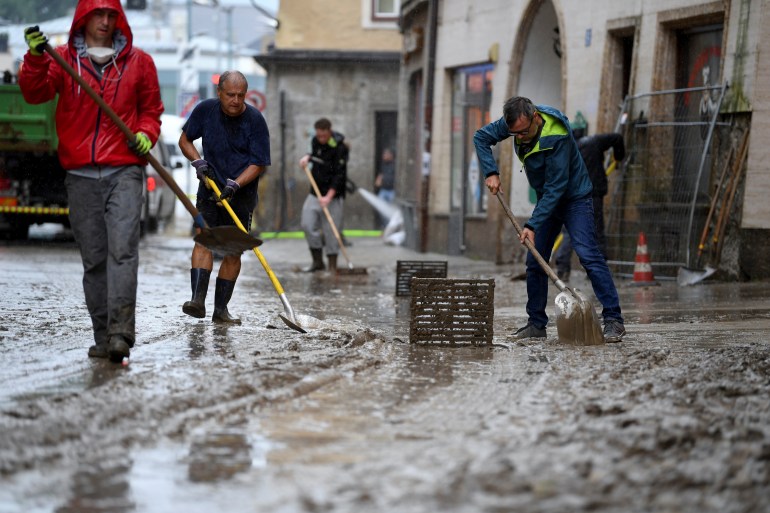German Chancellor Angela Merkel described, on Sunday, the damage caused by floods in the west of the country, as frightening.
And pledged to provide the state aid for reconstruction.
This, and the torrential rains have reached Austria, the southern neighbor of Germany.
Merkel said - at a press conference after a visit to one of the affected villages - that she was shocked by the extent of this damage, and told residents of the small town of Adenau in the state of Rhineland-Palatinate, "It is horrific ... words cannot describe the devastation that has occurred."
She stressed that the federal government would work alongside the states to repair the flood damage, and Finance Minister Olaf Scholz told the weekly Bild am Sonntag newspaper that the federal government would allocate more than 300 million euros ($354 million) for immediate relief, and billions of euros to repair the floods. Collapsed houses, streets and bridges.
Ayman Al-Zobeir, Al-Jazeera correspondent in Erfstadt, said that the federal government is expected to approve an urgent budget next Thursday to face flood damage, adding that everyone expects the damage to be large and the government will have to compensate those affected.
The chancellor called for an acceleration in the fight against climate change, saying that the damage caused by extreme weather events was "greater than in the past".
The number of flood victims in this country and other European countries rose to 184 people, including more than 157 in Germany alone, as well as injuring more than 670 others, in the worst natural disaster in the country in nearly 60 years.
Find the missing
The search for the missing and the removal of the damage caused by the floods continues, and Pfalz Malo Dreyer, Prime Minister of the State of Rhineland, pledged to continue the search work until the missing are found, and said that the authorities give this aspect a priority at the present time.
Hundreds are still missing or inaccessible as rising waters prevent access to many areas, and communications are still cut in some places.
We are still in Germany, where the floods have spread to other regions. Today, Bavaria, in the south of the country, was hit by torrential torrents that killed one person. Roads turned into rivers, some vehicles swept away, and vast areas of land covered in mud in the Berchtesgadener Land area. Hundreds of rescuers are searching for survivors in the adjacent area. for Austria.
Residents of Austrian Hallen remove mud from the floods that hit the region (Reuters)
In western Germany, about 110 people died in the worst-hit Arweiler region, south of Cologne, and police said more bodies were expected to be found as the water receded.
Belgium and the Netherlands
And in Belgium, neighboring Germany, the authorities declared tomorrow a national day of mourning after 27 were killed by the floods, and water levels began to recede today, and the authorities began carrying out cleaning and removing obstacles.
Army troops were sent to the eastern town of Pepinster to search for more victims after about 10 homes collapsed, and the National Crisis Center said 103 people were still "missing or unreachable".
Tens of thousands of people were without electricity, and authorities said there were concerns about the supply of clean drinking water.
In the Netherlands, the authorities have so far reported damage to property due to flooding, but no deaths or missing persons have been reported.
Parts of Switzerland remained on flood alert, although the threat posed by some of the most vulnerable bodies of water, such as Lake Lucerne and the river Aarv Berne, has receded.
Strong floods affected Austria as well, as the water swept the town of Hallen, near the border with Germany, yesterday evening when the Salzach River overflowed, and no injuries were reported.
In a related context, the Hasna Association of the Turkish Islamic Association of Milli Gorush distributed hot meals and drinking water to those affected by the floods disaster in Germany, the Netherlands and Belgium. The needs of disaster areas, and as a result, mobile kitchens moved to provide meals to rescue teams and those affected in Germany and Belgium.

